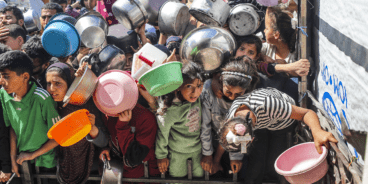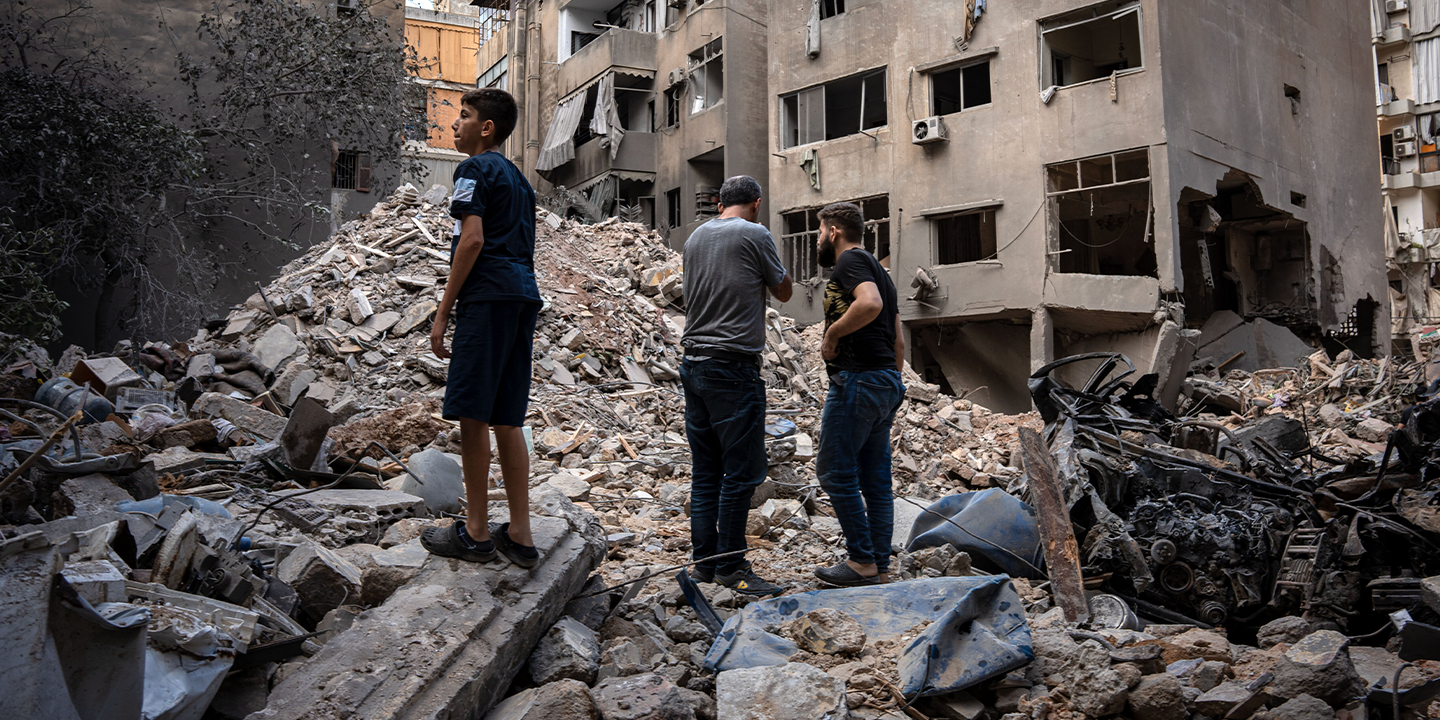

Atrocity Alert No. 414: Lebanon, Ethiopia and the UN Human Rights Council
Atrocity Alert is a weekly publication by the Global Centre for the Responsibility to Protect highlighting situations where populations are at risk of, or are enduring, mass atrocity crimes.
ISRAELI AIRSTRIKES TAKE DEVASTATING TOLL ON CIVILIANS IN LEBANON
Civilians in Lebanon remain at imminent risk as the hostilities between Israel and Hezbollah continue to sharply escalate. Relentless Israeli airstrikes are being carried out in densely populated areas, including in Beirut, and essential civilian infrastructure and property have been struck and destroyed. On 11 October Lebanon’s crisis response unit announced that 60 people were killed and 168 wounded in 24 hours alone. This includes from Israeli airstrikes in central Beirut that caused the collapse of two residential buildings housing families and displaced individuals. In recent days the Israeli military has also carried out repeated attacks on the UN Interim Force in Lebanon (UNIFIL), injuring at least five peacekeepers, damaging UN premises and vehicles and disrupting critical Mission movements. Attacks against peacekeepers and peacekeeping facilities are unlawful and may constitute war crimes.
The increasingly intense exchanges of fire over the past month mark the most significant escalation in the yearlong cross-border hostilities between Hezbollah and Israel. Over 2,300 people have been killed and 10,380 wounded by Israeli attacks, according to the Lebanese Health Ministry. Hezbollah and other armed groups continue to launch rockets and missiles into northern Israel, killing at least 16 civilians. Firing inherently inaccurate rockets into areas where civilians are present are indiscriminate attacks and violate International Humanitarian Law (IHL). Direct attacks on civilians and indiscriminate attacks which kill or injure civilians may constitute war crimes.
Amid the escalation, the Israeli military – which began a ground incursion into southern Lebanon two weeks ago – has issued “evacuation orders,” affecting more than 25 percent of Lebanon. UN experts have denounced these orders because “people are given unrealistically short” notice. Under IHL, parties to a conflict have a clear obligation to take all feasible precautions to avoid, or at least minimize, civilian harm when carrying out attacks, including giving effective advance warning for civilians in affected areas unless circumstances do not permit. The UN Refugee Agency said families are “desperate to escape the bombs,” with hundreds of thousands of people – including Syrian refugees who had previously sought safety in Lebanon – fleeing to Syria. An estimated 1.2 million people have been displaced – the vast majority in the last three weeks.
UN High Commissioner for Refugees, Filippo Grandi, said, “It is an urgent moral imperative to help the people affected by this recent escalation. They should not pay the price for the abysmal failure to find political solutions and end this vicious cycle of violence.”
International actors with influence must pressure all parties to comply with their obligations under IHL to prevent further suffering and civilian harm. Israeli forces must allow UNIFIL to fulfill its mandate and halt any threats against UNIFIL personnel. All states must cease arms exports and military assistance to Israel to ensure they are not aiding and abetting serious violations of international law and possible atrocity crimes. All arms transfers must also be suspended to Hezbollah and other armed groups in Lebanon.
FEARS GROW AS ETHIOPIAN GOVERNMENT LAUNCHES NEW OFFENSIVE IN AMHARA
Since 28 September the situation has escalated in the Amhara region of Ethiopia, where an armed militia known as Fano has been battling the federal government and aligned regional forces since April 2023. Federal government forces launched a new offensive to target the group and those who provide them with information or support, raising concerns for civilians. According to the federal government’s Army Spokesperson, Colonel Getnet Adane, “The only language they [armed rebel groups] understand is force. From now on we will talk to them in that language.”
In response Fano forces have announced a travel ban in the region. Clashes have since been reported in Awi, Central Gondar, East Gojjam, West Gojjam and North Shewa zones. Central and South Gondar zones have seen the heaviest fighting, including the use of airstrikes, that have caused civilian casualties.
Amid the offensive, the federal government has also clamped down on perceived supports of the Fano, local government officials, academics, civil society leaders, journalists and more, through the arbitrary arrests of at least 100 people. These arrests have driven many other critical voices into exile.
Amnesty International released a statement on 1 October highlighting flagrant violations of the rule of law in Amhara by the federal government. Amnesty’s Regional Director for East and Southern Africa, Tigere Chagutah said, “Eyewitnesses have stated that authorities came with a ‘list’ and failed to obtain arrest and search warrants before detaining hundreds of civilians across the region,” while those arrested have not been brought before a court, as required by national laws and the constitution. The Ethiopian Human Rights Commission has also urged the government to end arbitrary arrests and adhere to the rule of law, warning that the arrests could further erode trust in the region.
Since the conflict between the Fano and federal government erupted last year, there have been consistent reports of violations that may amount to war crimes, including federal government forces summarily and extrajudicially executing civilians in areas where the Fano has led offenses, use of drone strikes on civilians and targeted attacks on healthcare sites, health workers and patients receiving care.
Meanwhile, the UN, international and domestic human rights monitors have documented widespread abuses by the Fano against ethnic Oromos in the Amhara region, as well as likely war crimes, crimes against humanity and ethnic cleansing perpetrated against civilians in the neighboring Tigray region during the conflict between November 2020-2022. Other armed groups, including ethnic Oromo militias and the Tigrayan Defense Forces, have also committed atrocity crimes against Amhara civilians during these conflicts.
The federal government must ensure the safety of civilians in Amhara during efforts to combat the Fano, including through ending the practice of extrajudicial executions, and hold perpetrators of war crimes against civilians to account. Genuine dialogue and conflict resolution are urgently needed amid deepening insecurity in Amhara and beyond.
OUTCOMES OF THE 57TH SESSION OF THE UN HUMAN RIGHTS COUNCIL
On 11 October the UN Human Rights Council (HRC) closed its 57th session in Geneva. During the session, which started on 9 September, member states discussed and acted on several atrocity crises. The session was overshadowed by the one-year anniversary of unfathomable atrocities in the Occupied Palestinian Territory and Israel. On 10 October the HRC-mandated Commission of Inquiry warned that “Israel has committed war crimes and the crime against humanity of extermination” as part of a broader assault on Gaza. Despite well-documented grave violations of international law and crimes against the Palestinian population, several western governments continue to provide arms and military, diplomatic and political support to Israel.
During the session the HRC adopted a resolution on 10 October extending the mandate of the independent international Fact-Finding Mission (FFM) for the Sudan for a period of one year. The renewal comes amid a dramatic escalation in the ongoing conflict, including in North Darfur where civilians are facing an imminent risk of crimes against humanity and/or acts of genocide. Following significant advocacy by Venezuelan civil society, as well as the Global Centre, member states renewed the mandate of the FFM on Venezuela for a period of two years and requested the Office of the UN High Commissioner for Human Rights (OHCHR) to provide an update before the end of 2024 on rapidly intensifying state-led repression in Venezuela. The HRC also adopted resolutions to renew the mandates of the Special Rapporteur on Afghanistan and Burundi, as well as the Team of International Experts on the Democratic Republic of the Congo and the Independent Experts on the Central African Republic and Somalia.
On the 2nd anniversary of the so-called “Xinjiang report,” several member states delivered a joint statement recalling the findings by OHCHR that Chinese officials are committing possible crimes against humanity in the Uyghur Region. Victim and survivor communities continue to call for formal public discussions at the HRC on the ongoing atrocity situation in the Uyghur Region.
Meanwhile, on 9 October the UN General Assembly elected 18 governments for the HRC’s 2025-2027 term. While the Global Centre for the Responsibility to Protect, together with 10 other human rights organizations, warned that candidates such as Ethiopia do not fit the membership criteria for the HRC, uncompetitive votes for most regional groups each year result in the election of atrocity perpetrators. This not only risks undermining the credibility and legitimacy of the HRC, but also directly impacts the HRC’s potential to respond to protracted and emerging crises.
Elisabeth Pramendorfer, Geneva Representative at the Global Centre for the Responsibility Protect, said, “The HRC has a unique potential to respond to atrocity situations around the world. We call upon the Council to uphold its responsibility to protect and act upon the recommendations issued by the wider UN human rights system to better prevent and respond to the commission of atrocity crimes and ensure accountability for victims and survivors of conscious-shocking crimes.”
Related Content


Atrocity Alert No. 445: Sudan, Syria and Eritrea
